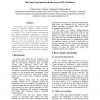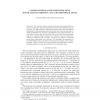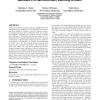148 search results - page 15 / 30 » Strong and Weak Policy Relations |
PRDC
2006
IEEE
14 years 1 months ago
2006
IEEE
The finite average response time model is a very weak distributed systems model: it permits runs with unbounded transmission and processing delays and it does not bound the relat...
ACIIDS
2009
IEEE
14 years 24 days ago
2009
IEEE
In this paper, two concepts from different research areas are addressed together, namely functional dependency (FD) and multidimensional association rule (MAR). FD is a class of i...
BSL
2000
13 years 7 months ago
2000
We recall the notions of weak and strong Euler characteristics on a first order structure and make explicit the notion of a Grothendieck ring of a structure. We define partially or...
ECSQARU
2009
Springer
14 years 2 months ago
2009
Springer
Partially preordered belief bases are very convenient for an efficient representation of incomplete knowledge. They offer flexibility and avoid to compare unrelated pieces of inf...
GECCO
2006
Springer
13 years 11 months ago
2006
Springer
Both genetic algorithms (GAs) and temporal difference (TD) methods have proven effective at solving reinforcement learning (RL) problems. However, since few rigorous empirical com...



